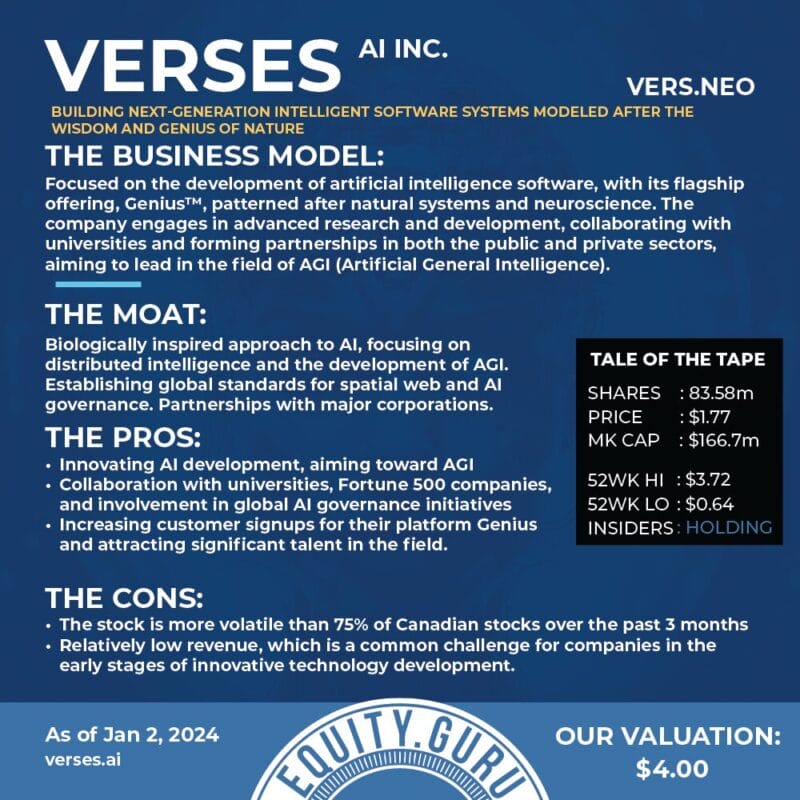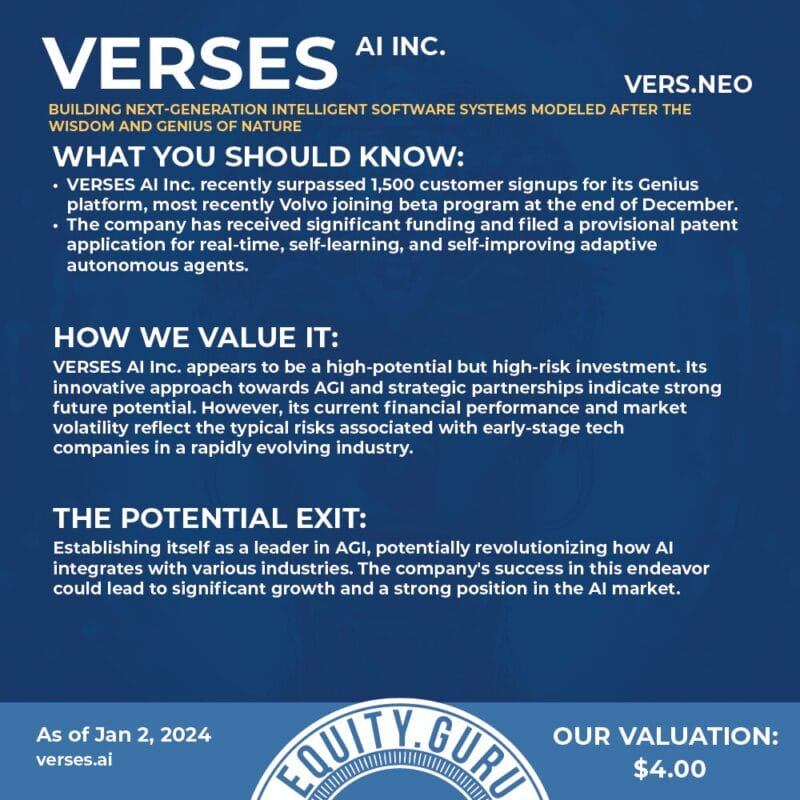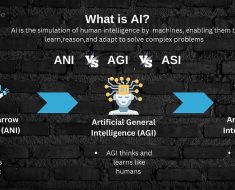Artificial General Intelligence (AGI), often termed as “strong AI”, will give machines the ability to understand, learn, and apply that knowledge on the same level that we do; a significant evolution from today’s mostly “narrow AI”, such as OpenAI’s GPT-3, which is famous for recognizing, translating, predicting, or generating text like ‘someone’ was on the other side of the chat. Impressive, but still a one trick pony. AGI systems can jump track, for instance, seamlessly transitioning from complex medical research to urban traffic systems management. Due to this adaptability and versatility, AGI would be perfect for complex multifaceted issues such as climate change, analyzing vast datasets, understanding ecological interdependencies, and proposing innovative solutions that might have eluded human experts. While true AGI is yet to be realized, companies like VERSES AI Inc. (VERS.NEO) are making significant strides toward that lofty goal.
Why current AI is narrow
Up until now, traditional AI training methods have been data-driven, heavily relying on large datasets, learning from examples – the more data you feed it, the better it becomes at recognizing patterns. For instance, a traditional AI trained for image recognition will go through thousands or millions of images to learn what a cat looks like. This methodology leans toward specificity, meaning their learning and decision-making are constrained to the domain they are trained on. A chess-playing AI, for instance, can’t suddenly start playing poker or diagnosing diseases unless it’s specifically trained for those tasks. These systems are also reactive, responding to the data they’re given. They can’t be proactive or make predictions about unobserved data.
Why AGI is general
AGI requires wholly different approach if it is to be successful and VERSES is innovating AGI development with something called active inference. Active inference is based on a model of how the world works. It’s like having an internal map or theory about the world, and the AI uses this to make predictions and decisions. Think of it as a scientist who has a theory and then tests it with experiments. The AI ‘imagines’ various scenarios and outcomes based on its model and chooses actions that align with its goals.
These systems are meant to be proactive. They don’t just passively learn from data; they actively seek out information to refine their understanding and achieve their objectives. Imagine a robot tasked with finding a hidden object in a room. Instead of randomly searching, it makes educated guesses on where to look based on its understanding of where objects are likely to be. Because of this, these systems are thought to be better at generalizing their learning to new situations. They’re not just relying on specific data examples, but also on a model of how things generally work. Therefore they can adapt to new, unseen scenarios more effectively.
Why VERSES makes waves
There are a lot of companies out there, that claim to be AI developers, when they are merely plugging into products like GPT with an API. VERSES, is founded and led by the people who are behind the research driving the field of artificial intelligence forward, sporting pocket protectors and penning white papers – they are legit with a capital “L.” Okay, the pocket protectors maybe not so much, but I am painting a picture here of industry-leading experts who are not only pushing the envelope but helping to define how the sector will operate.
Gabriel René, VERSES CEO, lays out what the company is all about in a recent letter to the world, “We want to offer a new foundation for building intelligent systems. Instead of an “artificial” path to intelligence we propose a “natural” path. One grounded in physics and in our deepest understanding of biological intelligence–first principles guided by the wisdom and genius of Nature.”
What is the natural path? Well, sentience is almost as old as life itself, so why reinvent the wheel, when the original model works so well. We live in an ecosystem of intelligence where we use our beliefs or world models to reason, learn, plan and act according to the all-encompassing rules of nature. Therefore, VERSES’ Genius(TM) platform allows for the creation of artificial agents with their own internal world models. This gives them the ability to make sense of the world around them, adapt to it and share that information and knowledge, creating a distributed network of shared intelligence capable of collaborating to produce the best result.
Will they get there?
The company’s Chief Scientist, Dr. Karl Friston, heads a research and development team which includes some of the world’s leading experts in computational neuroscience, computer science and machine learning, engineering, social science and philosophy. Dr. Friston himself has been celebrated as the world’s top neuroscientist with Wired Magazine noting him as “The Genius Neuroscientist Who Might Hold The Key to True AI.”
Then there’s the inevitable value of IP. In fact, in late November the company announced that it had filed a provisional patent application to enable real-time, self-learning and self-improving adaptive autonomous agents. This innovative method known as “Knowledge Expansion” enables intelligent systems to continuously learn and adapt in real time by emulating the encoding processes in the human brain. This approach could very well revolutionize the way AI learns.
Accolades, brain power and IP aside, some well known corporate entities are joining VERSES’ Genius(TM) beta program including international auto manufacturer, Volvo. This collaboration will entail Volvo testing Genius in applications related to advanced driver assistance and autonomous driving. Volvo has always been known for safety and its association with VERSES emphasizes its trust in the company’s ability to assist in creating a more intelligent driving system that upholds the safety for other drivers on the road.
My thinking is yes, they will get there.
Should they get there?
Terminator, War Games, and Neuromancer. Popular culture is well-familiar with AI feared or gone wrong. However, VERSES’s approach treats AI not as an alien product of technology, but like us, an extension of nature, which it believes provides a way to align this technology with our fundamental humanity, so it will operate under our ethics, values and laws and not launch a preemptive nuclear strike to end all life on earth.
As René sums up in his letter, “The end goal is not AGI. The end goal is what we can achieve as a civilization with AGI. The natural path invites us to realign our relationship with technology, Nature and each other. It calls on us to come together to imagine a Smarter World and then build it.”
What we think:




Where are we heading?
The AI market, in general, is growing rapidly. According to a report from Grand View Research, the global artificial intelligence market size was valued at USD 62.35 billion in 2020 and is expected to expand at a compound annual growth rate (CAGR) of 40.2% from 2021 to 2028.
AGI represents a paradigm shift in the field of AI, promising a future where machines could rival human cognitive abilities. While this future still seems a bit distant, the ongoing research and development at VERSES is laying the groundwork for what could be the next major leap in technology and its application across various facets of human life. A game changer for sure and a growth story almost like no other in terms of blue sky. Investors may want to take note. As always, do your due diligence and speak with an investment professional before making any portfolio decisions. Good luck to all.




